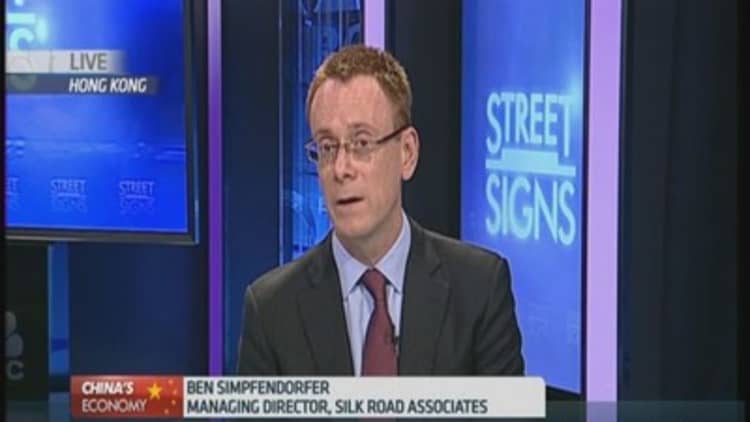Asian equities declined on Thursday as investors focused on key Chinese manufacturing data and sliding oil prices.
China's HSBC flash manufacturing purchasing manager's index (PMI) rose to a three-month high of 50.4 in October, but factory output fell to a five-month low. The report comes amid speculation of additional stimulus measures to boost growth after third-quarter gross domestic product hit a more than five-year low.
"While the manufacturing sector likely stabilized in October, the economy continues to show signs of insufficient effective demand. This warrants further policy easing and we expect more easing measures on both the monetary as well as fiscal fronts in the months ahead," said Hongbin Qu, China chief economist, and co-head of Asian economic research at HSBC.
Energy firms across the region declined as oil prices extended losses on Thursday. In the previous session, U.S. crude approached a two-year low following a jump in oil stockpiles.
Meanwhile, a shooting in Canada also unnerved investors. A gunman attacked the Parliament building and a Canadian solider was shot at a war memorial in Ottawa on Wednesday. The gunman in the Parliament, identified as a 32-year old convert to Islam, was killed by police, but authorities said they could not confirm whether both attacks were done by the same individual.
Shanghai 1% lower
China's benchmark Shanghai Composite fell to a one-month low for the third straight session. Oil producers declined on the back of lower crude prices; Sinopec and PetroChina dropped over 1 percent each.
Read MoreWhy China's property slowdown isn't so scary: Goldman
Hong Kong shares eased 0.4 percent after rallying over 1 percent in the previous session, which was its best daily gain in over a month.

Nikkei 0.4% lower
Japanese shares retreated after hitting a one-and-a-half week closing high on Wednesday. The benchmark Nikkei has been extremely volatile this week with a 4 percent gain on Monday, a 2 percent decline Tuesday and Wednesday's 2.6 percent recovery.
Read MoreNikkei's wild ride – Strap in or jump off?
Sentiment failed to get a boost from data that showed manufacturing activity expanded in October at the fastest pace in seven months, according to the Markit/JMMA flash PMI index.
Air bag maker Takata slumped 6 percent on news that U.S. prosecutors are investigating the company for defective air bags.
ASX flat
Australia's benchmark pulled back from the previous session's one-month closing high and snapped a seven-day winning streak.
Drilling services firm Boart Longyear soared over 50 percent after agreeing to a restructuring deal with Centerbridge Partners to reduce debt.
New Zealand's benchmark NZX 50 index finished at a record high after soft third-quarter inflation data suggested the central bank could leave interest rates steady for longer.

Kospi dips 0.3%
South Korean shares reversed opening gains, moving off Wednesday's one-and-a-half week high.
Shipbuilder Hyundai Heavy fell over 3 percent after workers endorsed a possible strike late on Wednesday, threatening to halt production. Other shipbuilders also fell; Daewoo Shipbuilding tanked 4.5 percent and Samsung Heavy eased 3 percent.
In earnings news, LG Display jumped 3 percent after operating profit rose to a two-year high in the July-September quarter. Hyundai Motor gained nearly 6 percent after posting a 29 percent annual fall in quarterly net profit but saying that it expected a better fourth-quarter performance.

